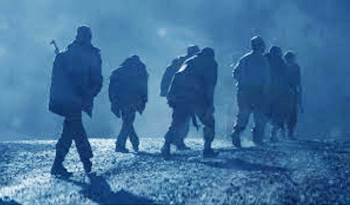‘The Annihilation of Christians’
02-20-2023 Billy Hallowell
Armenian Christians who are cut off from the outside world are facing desperate conditions. An ongoing blockade is preventing much-needed food, medicine and other resources from reaching the territory of Nagorno-Karabakh. One Christian group that’s sounding the alarm, fears that time is running out.
Baroness Caroline Cox, a prominent member of the U.K.’s House of Lords warns, “The situation is now very, very serious. Indeed, it has been said by people, it may indeed be an impending genocide.”
Those foreboding words summarize the state of affairs in Nagorno-Karabakh.
It’s been more than two months since Azerbaijani protestors blocked the only road into this small, landlocked region preventing the transport of food, medicine, and other essential needs.
“I’m afraid it’s a continuity of aggression by Azerbaijan against the Armenians,” Cox told CBN News. “The nether land of Nagorno-Karabakh was relocated by Stalin inside Azerbaijan, and Azerbaijan has been trying to carry out ethnic cleansing of the Armenians from there for a long time.”
As the blockade persists, the 120,000 predominantly Armenian Christians living there are suffering and pleading for assistance.
“The shortage of food is now getting desperate,” Cox said. “The shortage of medicines is very, very serious, especially medicines like insulin for people with diabetes, and the transfer of patients from Karabakh into Armenia needing urgent medical treatment, that has been very, very much stymied.”
She continued, “One has already died, so it is a very dire situation indeed.”
Gayane Beglarian’s 4-year-old daughter, Monika, suffers from liver cancer. Gayane recently sounded the alarm about her child being trapped inside Nagorno-Karabakh and risked missing life-saving treatment. “We were frightened,” she told CBN News. “And we were really worried about the situation because her life depends on this treatment.”
After weeks of anxiously awaiting transport, the Red Cross helped the family exit. Still, Gayane warns that other ailing residents need help.
“We have no necessary equipment; we have no doctors,” she said. “We don’t have doctors who can come there and have necessary treatment.”
Cox also warned about another element of the crisis — the potential destruction of Christian churches, historic landmarks, and entire cultures.
“This could be another stage of genocide, destruction of Christian people, destruction of Christian heritage,” she said. “And we need to pray.”
Cox continued, “The annihilation of Christians is very much part of the agenda or getting rid of the Christians. And that’s one of the things that the Armenians are really worried about because they will lose part of their unique Christian heritage.”
As the chaos continues, prayers for peace, eased tensions, and resolution are desperately needed.
Pray for Armenian Christians
Gev Iskajyan, the executive director of ANC-Artsakh, is sounding the alarm about the ongoing crisis in Nagorno-Karabakh, a small, landlocked region between Armenia and Azerbaijan. In an interview this week with CBN’s Faithwire, Iskajyan added more details about the rampant desperation 60 days into the crisis and warned the situation could devolve into genocide of the Armenian Christians living there. He detailed the dire impact the blockage of the Lachin corridor is having on Nagorno-Karabakh, also known as Artsakh. “Over 120,000 ethnic Armenians rely on that road [for] food, medicine, even energy and other vital supplies, necessities that the population needs to survive,” he said. “And that’s been essentially shut down…for over, you know, two months now.” From rolling blackouts to food shortages, the situation is dire, with “scarcity on every single [societal] level.” Iskajyan left his native California last year to live and work in Nagorno-Karabakh, shedding light on events unfolding on the ground. He also spoke about the broader conflict between Armenia and Azerbaijan, explaining how religious identity could play into the conflict. “Christianity is a bedrock of Armenian identity. It goes hand in hand,” he said. “It has since 300 A.D. “That is a part of the identity that people carry with them every day.” While many see the conflict as a land dispute, Iskajyan explained why religious elements could also come into play. Watch what he had to say.
